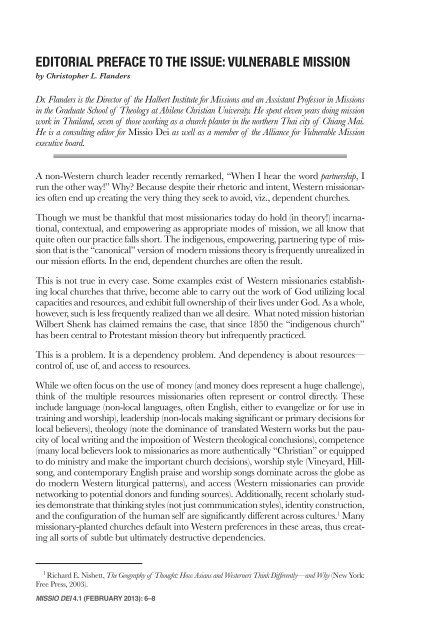VULNERABLE MISSION
VULNERABLE MISSION
VULNERABLE MISSION
You also want an ePaper? Increase the reach of your titles
YUMPU automatically turns print PDFs into web optimized ePapers that Google loves.
EDITORIAL PREFACE TO THE ISSUE: <strong>VULNERABLE</strong> <strong>MISSION</strong><br />
by Christopher L. Flanders<br />
Dr. Flanders is the Director of the Halbert Institute for Missions and an Assistant Professor in Missions<br />
in the Graduate School of Theology at Abilene Christian University. He spent eleven years doing mission<br />
work in Thailand, seven of those working as a church planter in the northern Thai city of Chiang Mai.<br />
He is a consulting editor for Missio Dei as well as a member of the Alliance for Vulnerable Mission<br />
executive board.<br />
A non-Western church leader recently remarked, “When I hear the word partnership, I<br />
run the other way!” Why? Because despite their rhetoric and intent, Western missionaries<br />
often end up creating the very thing they seek to avoid, viz., dependent churches.<br />
Though we must be thankful that most missionaries today do hold (in theory!) incarnational,<br />
contextual, and empowering as appropriate modes of mission, we all know that<br />
quite often our practice falls short. The indigenous, empowering, partnering type of mission<br />
that is the “canonical” version of modern missions theory is frequently unrealized in<br />
our mission efforts. In the end, dependent churches are often the result.<br />
This is not true in every case. Some examples exist of Western missionaries establishing<br />
local churches that thrive, become able to carry out the work of God utilizing local<br />
capacities and resources, and exhibit full ownership of their lives under God. As a whole,<br />
however, such is less frequently realized than we all desire. What noted mission historian<br />
Wilbert Shenk has claimed remains the case, that since 1850 the “indigenous church”<br />
has been central to Protestant mission theory but infrequently practiced.<br />
This is a problem. It is a dependency problem. And dependency is about resources—<br />
control of, use of, and access to resources.<br />
While we often focus on the use of money (and money does represent a huge challenge),<br />
think of the multiple resources missionaries often represent or control directly. These<br />
include language (non-local languages, often English, either to evangelize or for use in<br />
training and worship), leadership (non-locals making significant or primary decisions for<br />
local believers), theology (note the dominance of translated Western works but the paucity<br />
of local writing and the imposition of Western theological conclusions), competence<br />
(many local believers look to missionaries as more authentically “Christian” or equipped<br />
to do ministry and make the important church decisions), worship style (Vineyard, Hillsong,<br />
and contemporary English praise and worship songs dominate across the globe as<br />
do modern Western liturgical patterns), and access (Western missionaries can provide<br />
networking to potential donors and funding sources). Additionally, recent scholarly studies<br />
demonstrate that thinking styles (not just communication styles), identity construction,<br />
and the configuration of the human self are significantly different across cultures. 1 Many<br />
missionary-planted churches default into Western preferences in these areas, thus creating<br />
all sorts of subtle but ultimately destructive dependencies.<br />
1 Richard E. Nisbett, The Geography of Thought: How Asians and Westerners Think Differently—and Why (New York:<br />
Free Press, 2003).<br />
MISSIO DEI 4.1 (FEBRUARY 2013): 6–8


